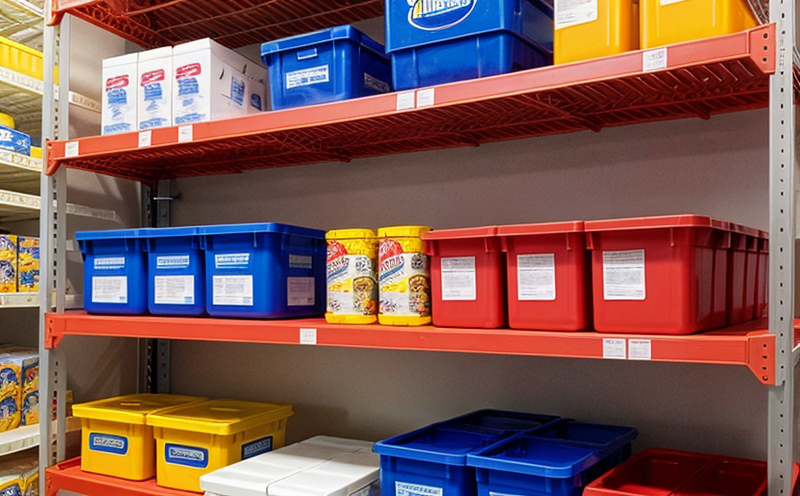ISO 52860 Accelerated Shelf Life Studies in Bakery Goods
The ISO 52860 standard provides a framework for conducting accelerated shelf life studies (ASLS) specifically applicable to bakery goods. ASLS is an essential tool for ensuring the quality and safety of food products by assessing their stability over time under controlled conditions that accelerate natural degradation processes.
Under this ISO standard, bakery goods are exposed to elevated temperature, humidity, and other environmental factors in a laboratory setting to simulate real-world conditions that would occur during storage and distribution. This helps manufacturers predict how long the product will remain safe and palatable under typical retail and consumer storage practices.
The process involves selecting appropriate test samples from batches or production lines, preparing them according to ISO 52860 guidelines, and placing them in a controlled environment chamber where temperature and humidity are adjusted based on expected market conditions. The study duration varies depending on the product but typically ranges between one week to several months.
During testing, various parameters are monitored continuously including color change, texture alterations, microbial growth levels, fat oxidation rates, and overall sensory attributes like aroma and taste perception. All these indicators provide valuable insights into potential spoilage mechanisms affecting bakery goods over time.
Once the study period concludes, detailed reports are generated outlining all observed changes along with calculated shelf life estimates for each product variant tested. These findings enable companies to make informed decisions about packaging materials, storage methods, and labeling practices aimed at extending consumer satisfaction while maintaining regulatory compliance.
- Environmental Factors: Temperature ranges between 30°C - 45°C, relative humidity levels around 75% RH are common for accelerated testing.
- Sample Preparation: Representative samples must be taken from production lines ensuring uniformity across batches being tested.
- Monitoring Protocols: Continuous observation of physical and chemical properties throughout the study period is crucial for accurate results.
Why Choose This Test
Selecting ISO 52860 shelf life testing offers several advantages over traditional methods, making it an ideal choice for food and feed manufacturers looking to enhance product quality assurance.
Firstly, this approach allows businesses to identify critical factors influencing spoilage early on in the development phase. By understanding what triggers degradation faster than usual, companies can implement corrective measures during formulation stages itself rather than after launch. Secondly, it provides a standardized method across industries ensuring consistency and comparability between different brands or suppliers.
Thirdly, accelerated shelf life studies help reduce waste by optimizing storage times without compromising safety standards. This translates into cost savings for manufacturers who can extend product life spans effectively using this information. Lastly, compliance with international standards like ISO 52860 enhances credibility among consumers and stakeholders alike fostering trust in brand integrity.
For quality managers responsible for maintaining high standards within their organizations, choosing this service ensures that they stay ahead of regulatory requirements while also contributing positively towards sustainability goals. It demonstrates a commitment to delivering safe, nutritious products consistently across all markets served by the company.
Quality and Reliability Assurance
The implementation of ISO 52860 shelf life studies plays a pivotal role in ensuring both short-term viability and long-term reliability of bakery goods. By subjecting products to rigorous testing conditions, manufacturers gain valuable insights into how various environmental factors impact the stability of their offerings.
One key aspect is monitoring microbial growth which helps prevent contamination risks associated with improperly stored items reaching end consumers. Another critical parameter examined during these trials relates to lipid oxidation levels indicating whether fats present in doughs or fillings begin breaking down prematurely leading to off-flavors or textures that could deter customers.
Furthermore, color changes and texture modifications provide important information regarding aesthetic appeal throughout the shelf life cycle. Ensuring consistent appearance is crucial not only for maintaining brand identity but also for appealing visually on store shelves where visual presentation significantly influences purchase decisions.
By leveraging ISO 52860 accelerated shelf life studies, food and feed companies demonstrate their dedication to upholding strict hygiene practices throughout every stage of production. This aligns perfectly with broader industry trends emphasizing transparency about ingredient sourcing as well as manufacturing processes being carried out under stringent quality controls.
The results from these tests form the basis for making informed adjustments necessary to meet desired shelf life targets consistently across all batches produced. Such precision contributes significantly towards building a reputation characterized by excellence in product performance and reliability among industry peers and customers alike.
Environmental and Sustainability Contributions
- Emission Reduction: By accurately predicting shelf life, businesses can optimize storage conditions reducing energy consumption required to maintain optimal temperatures during transport and retail sale.
- Resource Efficiency: The ability to extend product longevity minimizes waste generation associated with expired goods, thereby conserving raw materials used in manufacturing.
- Packaging Optimization: Understanding how different packaging solutions perform under accelerated conditions aids in selecting more appropriate containers designed specifically for extended shelf life.





